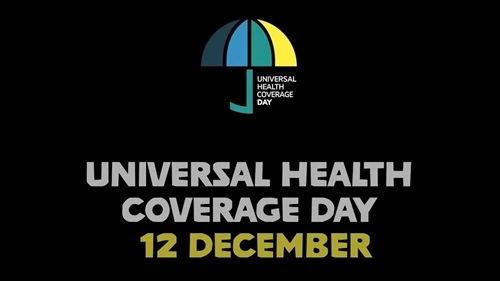International Universal Health Coverage (UHC) Day, observed annually on December 12, is a United Nations-designated day that highlights the importance of ensuring access to quality healthcare services for everyone, everywhere, without facing financial hardship. This day serves as a global call to action to accelerate progress toward achieving universal health coverage, a critical component of the United Nations Sustainable Development Goals (SDGs), particularly Goal 3: Good Health and Well-Being.
The observance raises awareness about the need for equitable, resilient, and people-centered healthcare systems and emphasizes that health is a fundamental human right.
History and Origins

Universal Health Coverage Day was officially recognized by the United Nations General Assembly (UNGA) in 2017, following the adoption of Resolution 72/138. The resolution reaffirmed the international commitment to ensuring health for all and building robust health systems worldwide.
The date, December 12, marks the anniversary of the 2012 UN General Assembly resolution that endorsed universal health coverage as a priority for sustainable development. Since then, UHC Day has become a platform for governments, organizations, and individuals to advocate for stronger health systems and increased investment in healthcare.
What is Universal Health Coverage?
Universal health coverage means that all individuals and communities can access the full spectrum of essential healthcare services—ranging from prevention and treatment to rehabilitation and palliative care—without suffering financial hardship.
Key components of UHC include:
- Equity in Access: Everyone has access to the healthcare services they need, regardless of income, location, or social status.
- Quality Care: Health services should be effective, safe, and people-centered.
- Financial Protection: No one should face financial ruin or poverty due to out-of-pocket healthcare expenses.
UHC is critical for reducing health inequalities and ensuring sustainable development.
Significance of Universal Health Coverage
Universal health coverage is essential for:
- Improving Health Outcomes: By providing access to healthcare, UHC reduces mortality rates, improves quality of life, and increases life expectancy.
- Promoting Economic Development: Healthy populations are more productive, contributing to economic growth and reducing healthcare costs in the long term.
- Reducing Inequality: UHC addresses disparities in healthcare access, ensuring that marginalized and vulnerable groups are not left behind.
- Building Resilient Systems: Robust healthcare systems are better equipped to respond to emergencies, such as pandemics, natural disasters, and conflicts.
Global Progress Toward UHC
While significant progress has been made in advancing universal health coverage, challenges remain. According to the World Health Organization (WHO) and the World Bank:
- Approximately half the world’s population lacks access to essential health services.
- Around 1 billion people face financial hardship due to out-of-pocket healthcare expenses.
- Inequalities in healthcare access are stark, with low- and middle-income countries bearing the greatest burden.
The COVID-19 pandemic further highlighted the critical need for resilient healthcare systems and exposed the gaps in access, affordability, and preparedness worldwide.
Themes of Universal Health Coverage Day
Each year, UHC Day adopts a specific theme to focus on pressing issues in healthcare access. Recent themes include:
- 2023: “Health for All: Every Person, Everywhere” – Reinforcing the global commitment to leaving no one behind in the pursuit of universal health coverage.
- 2022: “Build the World We Want: A Healthy Future for All” – Highlighting the importance of strong, equitable healthcare systems in shaping a better world.
These themes guide global campaigns, discussions, and advocacy efforts.
Challenges in Achieving Universal Health Coverage
Despite international commitments, several challenges hinder progress toward universal health coverage:
- Insufficient Funding: Many countries face resource constraints, limiting their ability to invest in healthcare infrastructure, personnel, and services.
- Workforce Shortages: A lack of trained healthcare professionals, particularly in rural and underserved areas, affects service delivery.
- High Out-of-Pocket Costs: Inadequate health financing mechanisms force individuals to bear the brunt of healthcare expenses.
- Health Inequalities: Marginalized groups, including women, children, and indigenous communities, often face barriers to accessing healthcare.
- Global Crises: Pandemics, conflicts, and climate-related disasters strain healthcare systems, diverting resources and delaying progress.
How International Universal Health Coverage Day is Observed
UHC Day is marked by events, campaigns, and initiatives that promote awareness and inspire action:
- Advocacy Campaigns: Governments and organizations launch campaigns to emphasize the importance of UHC and advocate for increased investment in healthcare.
- Policy Dialogues: Stakeholders discuss strategies to strengthen healthcare systems and ensure equitable access to services.
- Community Engagement: Local events, health fairs, and public forums encourage communities to understand and demand their right to healthcare.
- Media Outreach: Social media campaigns, articles, and documentaries highlight the stories of individuals affected by gaps in healthcare access and the benefits of UHC.
- Capacity-Building Workshops: Healthcare professionals and policymakers participate in training sessions to enhance their ability to implement UHC initiatives.
How You Can Support Universal Health Coverage
Individuals and organizations can play a vital role in promoting universal health coverage by:
- Raising Awareness: Share information about UHC and its importance on social media and within your community.
- Advocating for Policy Change: Urge governments to prioritize healthcare funding and adopt policies that promote equity and access.
- Supporting Health Programs: Volunteer with or donate to organizations working to improve healthcare services for underserved populations.
- Educating Yourself: Learn about healthcare challenges in your country and the steps needed to address them.
Looking Ahead: A Healthier Future for All
Achieving universal health coverage requires global solidarity, political commitment, and sustained investment in healthcare systems. As the world moves toward the 2030 Sustainable Development Agenda, UHC remains a cornerstone of achieving health equity and resilience.
Governments, organizations, and individuals must work together to address the barriers to UHC and ensure that no one is left behind. Strengthening primary healthcare, improving health financing, and leveraging technology are essential steps in building a healthier, more equitable world.
Conclusion
International Universal Health Coverage Day is a powerful reminder that health is a fundamental human right, not a privilege. By raising awareness, advocating for equitable healthcare systems, and fostering collaboration, we can ensure that every person, everywhere, has access to quality healthcare without financial hardship. As we commemorate this day, let us renew our commitment to achieving universal health coverage and building a future where health for all is a reality, not just a goal. Together, we can create a world where no one is left behind.

